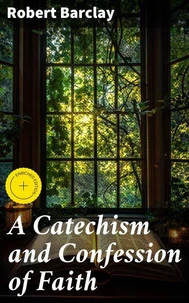A Catechism and Confession of Faith: Quakers Doctrine
Par :Formats :
Disponible dans votre compte client Decitre ou Furet du Nord dès validation de votre commande. Le format ePub est :
- Compatible avec une lecture sur My Vivlio (smartphone, tablette, ordinateur)
- Compatible avec une lecture sur liseuses Vivlio
- Pour les liseuses autres que Vivlio, vous devez utiliser le logiciel Adobe Digital Edition. Non compatible avec la lecture sur les liseuses Kindle, Remarkable et Sony
 , qui est-ce ?
, qui est-ce ?Notre partenaire de plateforme de lecture numérique où vous retrouverez l'ensemble de vos ebooks gratuitement
Pour en savoir plus sur nos ebooks, consultez notre aide en ligne ici
- Nombre de pages67
- FormatePub
- ISBN406-633--811334-4
- EAN4066338113344
- Date de parution04/01/2022
- Protection num.Digital Watermarking
- Taille225 Ko
- Infos supplémentairesepub
- ÉditeurMUSAICUM BOOKS
Résumé
Robert Barclay's 'A Catechism and Confession of Faith: Quakers Doctrine' is a profound exploration of Quaker beliefs and practices, presented in a clear and concise catechism format. Written in the 17th century, Barclay's book embodies the theological and philosophical debates of the time, offering insights into the Quaker movement's origins and principles. With its systematic approach to doctrine, the book serves as a valuable resource for understanding the foundations of Quaker faith.
Barclay's writing style is scholarly yet accessible, making complex theological concepts understandable to a wide audience. Through his comprehensive exploration of Quaker belief, Barclay provides readers with a deeper understanding of the spiritual underpinnings of the Quaker tradition. Robert Barclay, a prominent Quaker theologian and apologist, was deeply involved in the religious debates of his time.
His background as a Quaker leader and theologian informs the content of 'A Catechism and Confession of Faith', as he seeks to clarify and defend Quaker beliefs in the face of criticism. Barclay's commitment to his faith is evident in his meticulous exposition of Quaker doctrine, making the book a testament to his intellectual rigor and spiritual devotion. I highly recommend 'A Catechism and Confession of Faith: Quakers Doctrine' to readers interested in the history of religious thought, theology, and the Quaker tradition.
Barclay's insightful examination of Quaker beliefs offers a valuable contribution to the study of religious philosophy and the evolution of Christian doctrine.
Barclay's writing style is scholarly yet accessible, making complex theological concepts understandable to a wide audience. Through his comprehensive exploration of Quaker belief, Barclay provides readers with a deeper understanding of the spiritual underpinnings of the Quaker tradition. Robert Barclay, a prominent Quaker theologian and apologist, was deeply involved in the religious debates of his time.
His background as a Quaker leader and theologian informs the content of 'A Catechism and Confession of Faith', as he seeks to clarify and defend Quaker beliefs in the face of criticism. Barclay's commitment to his faith is evident in his meticulous exposition of Quaker doctrine, making the book a testament to his intellectual rigor and spiritual devotion. I highly recommend 'A Catechism and Confession of Faith: Quakers Doctrine' to readers interested in the history of religious thought, theology, and the Quaker tradition.
Barclay's insightful examination of Quaker beliefs offers a valuable contribution to the study of religious philosophy and the evolution of Christian doctrine.
Robert Barclay's 'A Catechism and Confession of Faith: Quakers Doctrine' is a profound exploration of Quaker beliefs and practices, presented in a clear and concise catechism format. Written in the 17th century, Barclay's book embodies the theological and philosophical debates of the time, offering insights into the Quaker movement's origins and principles. With its systematic approach to doctrine, the book serves as a valuable resource for understanding the foundations of Quaker faith.
Barclay's writing style is scholarly yet accessible, making complex theological concepts understandable to a wide audience. Through his comprehensive exploration of Quaker belief, Barclay provides readers with a deeper understanding of the spiritual underpinnings of the Quaker tradition. Robert Barclay, a prominent Quaker theologian and apologist, was deeply involved in the religious debates of his time.
His background as a Quaker leader and theologian informs the content of 'A Catechism and Confession of Faith', as he seeks to clarify and defend Quaker beliefs in the face of criticism. Barclay's commitment to his faith is evident in his meticulous exposition of Quaker doctrine, making the book a testament to his intellectual rigor and spiritual devotion. I highly recommend 'A Catechism and Confession of Faith: Quakers Doctrine' to readers interested in the history of religious thought, theology, and the Quaker tradition.
Barclay's insightful examination of Quaker beliefs offers a valuable contribution to the study of religious philosophy and the evolution of Christian doctrine.
Barclay's writing style is scholarly yet accessible, making complex theological concepts understandable to a wide audience. Through his comprehensive exploration of Quaker belief, Barclay provides readers with a deeper understanding of the spiritual underpinnings of the Quaker tradition. Robert Barclay, a prominent Quaker theologian and apologist, was deeply involved in the religious debates of his time.
His background as a Quaker leader and theologian informs the content of 'A Catechism and Confession of Faith', as he seeks to clarify and defend Quaker beliefs in the face of criticism. Barclay's commitment to his faith is evident in his meticulous exposition of Quaker doctrine, making the book a testament to his intellectual rigor and spiritual devotion. I highly recommend 'A Catechism and Confession of Faith: Quakers Doctrine' to readers interested in the history of religious thought, theology, and the Quaker tradition.
Barclay's insightful examination of Quaker beliefs offers a valuable contribution to the study of religious philosophy and the evolution of Christian doctrine.




